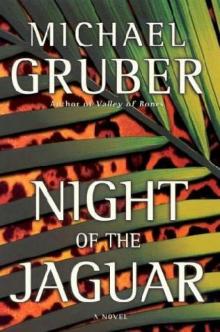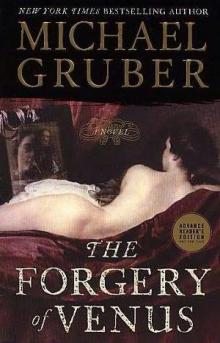- Home
- Michael Gruber
The Good Son Page 3
The Good Son Read online
Page 3
How will the family deal with her? She’s sure of Rukhsana, Farid’s sister, an actual friend: they e-mail several times a month and Rukhsana visits when she’s in Washington on a story or just to go shopping and see Farid. Nisar, the middle brother, will exhibit the typical inoffensive charm of the businessman and politician and hide the person, if any, behind the smiling mask. Seyd, the youngest, the soldier-he must be a major by now at least-an ornament of the Inter-Services Intelligence Directorate, the dreaded and wonderfully incompetent ISI. Seyd, if he even bothers to meet her, will be cold, formal; he disliked her twenty years ago and has not changed his opinion. If Baba had not died, things might have been different.
A deeper pang here, the old wound, intensified by the sound of the ghazal and the memory of listening to that music in his presence. Self-torment is a part of her personality; it is why she plays that music on these long trips, so that the reverie of the stratosphere might be infused with some contact with that time. She has been analyzed by an expert in Zurich, the whole Jungian treatment, and the result is she still suffers but at least knows why, suffers like a human and not a dog, and she can use the suffering in her work; the wounded healer reaches deepest into the psyche, below the level of history and anamnesis to the dark core where the devils play.
The drone of the music blends with the noise of the plane’s engines. Hypnotic: the persona is alert to the immediate surround but beneath this the true self breaks loose of time and is transported back to a former existence as a nineteen-year-old ex-circus performer with a suitcase full of cash and nowhere to go.
In those days you couldn’t fly direct to Lahore, you had to go to Karachi and take the train, so there she was with that suitcase pressing against the back of her knees in a first-class carriage. Farid had insisted she was not to undergo the rigors of a second-class Pakistani train. Still, the sights of Karachi were exotic enough as they traveled by cab from the airport to the train station; it was like an endless circus sprung free of the big top and smeared across a whole land, a boiling mass of brown people in exotic dress and, like the circus people she knew, seemingly possessed of a more intense existence, a striving desperation not to sink and be lost in the cruel stew.
She recalls Farid on that journey, sitting next to her on the sticky-hot seat, more formal than he had been in New York, a different being in his own land. They spoke little as the train rushed onward; she’d ask a question, he’d answer in his precise way and fall silent. He was nervous, she could tell, and no wonder, bringing a strange woman-a girl, really-with a pile of dubious cash into his father’s house. It was only later that she understood what a colossal act of kindness and generosity it was. He never touched her during the entire trip. He’d purchased Pakistani clothes for her in the bazaar in Karachi and showed her how to wear them, her first time in shalwar kameez, but she was used to costumes, to being someone she was not. It was at least not a spangled leotard and a feathered headdress and she was not on a horse under the spotlight.
He said it was fate that had brought them together, and he was not just uttering a banality, as might have come from the mouth of an American. She had just happened to be in Central Park that day, in the middle of the morning, after several exhausting and unsuccessful days of seeking secretarial work, and she was not looking forward to the bus ride back to Paterson, having to tell Guido that she had failed and hear his mockery: Why can’t you get a job cleaning, for God’s sake; who do you think you are?
Who she thought she was-who her mother thought she was-was not someone chained to the rough life of tiny failing circuses, doomed to live in trailers, fifteen shows a week during the season and scrabbling at menial jobs in the winter, no education, no culture, living with stupid, larcenous people. So Marta Kracinski of Warsaw, from a murdered family-an aristocratic family in the Polish manner, proud as bishops, poor as dirt-sat every evening of Sonia’s young life and, by the light of a dim bulb or a hissing gas lantern, put her girl to her lessons, conveying an eclectic, idiosyncratic education: the classic books of Europe, whichever of them happened to turn up in small-town used bookstores; the French language; the Catholic religion; mathematics up through plane geometry; and more than American girls usually get of the glorious and tragic history of Poland. And typing. Marta was big on typing. If you could type, you could get an office job, you could meet a man, a distinguished man-that is, not like Dad. Sonia could type over sixty words a minute by the time she was fifteen and handled all the small correspondence of the circus office.
Sonia rarely thinks of this part of her life and what came after. She has come to terms with her past, as she learned to say in her therapy. Coming to terms: a curious phrase, she thinks, a metaphor from the military and affairs of state. Armies and governments at war come to terms-who will yield and who will gain-and the use of the phrase in therapy supposes a war in the psyche that must be ended. But it never ends; it is like the War on Terror.
Her first meeting with Farid, on a warm day in late May: sitting on a park bench, her belly hollow and griping, with not a dime for food, watching a woman feeding bread to a flock of pigeons and wondering, in a hysterical way, what the woman would say if Sonia got down on her knees and scrabbled for the bread among the filthy birds. A man sat down on the opposite end of her bench, took a bag out of his briefcase, opened a Styrofoam container, and began to eat from it. From which the most wonderful odor arose, spicy and rich with the promise of stewed meats. She felt the spit well up in her mouth and felt also the blush of shamed anger. She looked at the man-stared, really-and after a while he looked up at her. He was dressed like a student, in chinos and a checked short-sleeved shirt, sneakers on his feet. He met her eyes, then looked nervously away.
The pigeon fancier dumped her bread bag, shaking out the crumbs, and left. Sonia sat wretchedly in place, thinking about money, about what she would and would not do to get it, about the man on the bench, heedlessly eating, when with a clatter of wings the whole flock of pigeons rose into the air, and within that clatter came another, stranger sound, a flat noise, like a bat hitting a pillow.
In the center of the asphalt path a small tan hawk clutched a pigeon, from whose open mouth a small ruby of blood shone. The next moment the hawk flew off with slow flaps of its long wings, straining to lift its lunch.
Sonia said, “Wow!” and looked at the man on the bench. His face was transformed by wonder and he smiled at her, white teeth flashing in a face that was almost the same color as the hawk’s plumage. He said something in a bubbling, throaty language she did not recognize and, at her puzzled expression, recited in slightly accented English:
“This was fated from the beginning of the world,
That this pigeon should meet her hawk.
So, we too, from the moment I saw your coils of black hair
And let your talons tear my heart.
“It’s a poem from my country,” he added. “Originally in Urdu.”
“Are you an Urdu?” she asked, and touched her black hair, half consciously.
He laughed sweetly. “No, Urdu is the language of the poet. I am Punjabi, from Pakistan.”
“Is that like India?”
“Very unlike,” he said, still smiling. “We are neighbors, however, like that hawk and the pigeon.”
Then he introduced himself formally, and she did the same, and they chatted there on the sunny bench. He was Farid Laghari, a law student at Columbia, just finishing his degree. She hid her own life from him then, ashamed, and the shame surprised her. She was ashamed of being an ignorant horse girl in a failed circus, speaking to this polite and educated man. Now she recalled her mother speaking of manners and breeding, and how the carnival people had none, and Sonia had not understood what she meant; she had imagined it was part of the fantasy world called Poland or an oblique way of nagging her husband.
But this was the thing itself, here on this park bench: manners and good breeding. She turned toward it like a flower to the sun.
After a time he looke
d at his watch and told her he had to go. They stood up, and the world spun and she fell clumsily against him.
“What is wrong?” he cried. “Are you ill?”
She was starving. She had breakfasted on a cup of coffee and a doughnut at six that morning and had then cleaned the stalls and exercised the horses before cleaning herself and dressing for the city. She confessed this and he stared at her, shocked.
“Horses?” he said. “You are a groom?”
And then the whole story came out, what she did: the stranded circus, her disgraceful poverty, though never disgraceful before now, but she could not stop talking to him. After listening to the tale he insisted on buying her something to eat; he took her to a restaurant on Madison Avenue, bought her a meal such as she had never eaten, and watched her consume it with evident pleasure. During the meal it emerged that she was looking for work as a typist, and he said, “This must be fate again, because I am just now seeking a typist. I have whole notebooks that must be transcribed for the law review, and later there is my thesis to be typed as well.”
So they agreed. She would begin working for him the next day.
At Zurich Sonia boards the Pakistani International Airlines flight to Lahore. It is another red-eye, scheduled to arrive in Lahore at seven-thirty the following morning. She is seated next to a bulging Lahori matron of a familiar type, a real begum who, on spotting Sonia’s getup and learning her name, immediately engages her in conversation or, rather, monologue. She begins in a thick subcontinental English but after the plane has ascended switches to the Mahji dialect of Panjabi. Sonia has not spoken Panjabi for some years and at first she picks up barely one word in three, but the flight is long, the begum tireless, and in a while the old synapses start firing again and she can appreciate in full the perfect banality of the discourse.
Little response is required in any tongue. The woman drones on and Sonia’s thoughts are free to drift, carried back by the flow of Panjabi to her first entrance into Lahore and her first meeting with B. B. Laghari.
There he was in his white suit and his British school tie, behind a rose-wood desk in his study with the fan turning slowly overhead. She stood in front of him like a schoolgirl and he stared at her out of his hawk face, although not unkindly, and said, “My son tells me you have an interesting story. I would like to hear it. Please take a seat.”
She did. “What part of the story?”
He answered, “All of it, if you please. I have a great love of stories. Start with your family. Farid tells me they were performers in the circus.”
So she told him a story, one that would entrance him, one that would make him have sympathy for her and, more than that, make him think of her as an interesting person, because she had nowhere else to go and he was the power. Some of it was even true.
She started with her parents. Tadeuz Bielicki is a stage magician in Poland, working in a provincial town. It’s wartime. Marta Kracinski is in the Polish resistance, on the run from the Gestapo. Tadeuz saw her in the freezing little theater of some miserable town and approached her after the show; they spoke; she asked for help: You’re a magician, she said, make me disappear! And he did. He used the hidden compartments of his apparatus, and they escaped to Yugo slavia. It turns out that he was some kind of minor Allied agent, and after the war, as pay-back, the visas appear, first for Britain, then for the United States, where Sonia is born.
The pair make their living in the small touring circuses of the era: Tadeus is a juggler and magician, Marta sews costumes, takes tickets, and performs as an understudy where a beautiful woman is needed to replace one of the regular performers. Of course she can ride, like any Polish aristocrat, so she rides the circus horses and atop the elephants; she is the lovely lady in the cat act who holds a flaming hoop: the tamer cracks the whip and the tiger leaps through it. She is of course entirely fearless; she walks among the lions like a queen, pink tights, red spangled costume, plumes nodding on her golden head.
Sonia saw she had him now; he leaned toward her, his large liquid dark eyes aglow.
The show traveled all around the country and as Sonia grew she joined its marvelous life, becoming a true child of the circus. She learned to ride a horse and to stand on its back as it circled the ring, on one foot or on her hands; she learned to sit on the elephant’s trunk and be lifted high; and she learned especially her father’s tricks with coins, scarves, cups, and cards. Her little hands were clever; she worshipped her father and lived for his praise; she excelled at legerdemain: her father said often he had never seen her like.
From her mother she learned everything else, especially about Marta’s favorite subject, her own distinguished family: ancient, deeply cultured, wealthy, ruined.
Sonia saw this part hit home as well; she knew the Lagharis were a family like that: Indian Muslims expelled to Pakistan, heads packed with memories of lost glory.
Sonia lowered her eyes. Now a theatrical pause, a little catch in the voice: here begins the tragic part. One night, Marta is performing in the center ring. The lions and tigers are leaping about, the whip is cracking; the finale calls for a static display, all four cats must sit up on their platforms while Marta ascends an empty platform between two lions. Each lion rests a paw on one of her shoulders. Marta raises her arms in salute; her smile shines in the pink light. The lion tamer bows, a fanfare from the band, the lights go out, and the band strikes up the music for the march of the elephants.
Sonia was up on an elephant waiting in the dark wings, watching her mother finish the act. She sees Marta take her bow and the lion tamer do the same, and she is watching as, just before the first chord of the fanfare, the right-hand lion, a young male named Odin who has done this a thousand times like a lamb, leans over and grabs Marta’s head in his jaws.
At this Laghari Sahib gasped and uttered what must have been an oath in Urdu. “My God,” he cried, “how very dreadful! What did you do?”
“I rode in on my elephant and did the act,” said Sonia. “The show must go on. They had blacked out the cat ring immediately so the crowd thought it must be part of the act, a fake, and of course the circus went along with this error, which is what they always do when there’s an accident in the show.”
She resumed the rest of the story. Marta was killed instantly; afterward, Tadeuz was never the same: he pined, he became ill, it was TB, he hadn’t the will to fight it. He died that winter, and Sonia continued with the circus, whose slow decline accelerated after Marta’s disaster. The end came one autumn in a muddy field outside Paterson, New Jersey, when the circus awoke to find the owners had vanished, leaving the troupe owed a month’s pay and having sold the vehicles and livestock for ready cash.
Everyone had to find work because winter was coming. Each day Sonia took the train to New York, looking for office work. She could type but she had no references, and that was when fate intervened more kindly: she had met Farid in the park and become his secretary, and he had fallen in love with unsuitable her.
So she spent her days working for Farid and her nights in a spare bedroom in his apartment, but every Thursday she would get on a bus in Chinatown and travel with the Chinese gamblers to Atlantic City. This was from loyalty, because after her parents died, Sonia had been taken in by a large family of aerialists, the Armelinis. Guido, the patriarch, had visions of a new show based on his family act. But where would the funds for this come from? It turned out Guido knew some people in Atlantic City who ran high-stakes poker games. They were always looking for a mechanic, and Guido thought Sonia would be perfect for the job.
Here Laghari Sahib interrupted. “Excuse me, what is this ‘mechanic’?”
“A card sharp. My father had taught me all kinds of sleight-of-hand with cards, you know, for amusing tricks. But the same skills can be used to cheat.”
“Please explain this.”
“Well, when the cards are exposed after a play, the dealer sweeps them up and shuffles the deck. It is possible to mark the location of the cards in your hea
d and then arrange them in any order you like during a riffle shuffle: that is, arrange them undetectably while you are apparently giving them a good shuffle. You can also compensate when someone else cuts the cards afterward. If you are very good you can do what is called a double duke, where you deal the mark a very good hand, maybe a full house-tens high, say-and deal your partner a higher full house or a flush. So the mark bets heavily and you win a lot. I had learned to stack cards from the time I could hold a deck, perhaps five or six years old, so I was quite good at it. At first I refused, but we were in a bad way, all the circus people, we hardly had enough to eat, and so in the end I agreed. He said no one would suspect a girl dealer.”
So she worked the weekend games in Atlantic City and no one did suspect, and the money accumulated. But unfortunately the people who’d set up the cheating games wanted more, as those kinds of people always do, and not only did they refuse to pay Guido his share but they wanted Sonia; they wanted to take her to Vegas like a portable cash machine. So one night in a cheap motel in Atlantic City, when Guido demanded his cut and the men started to beat him, Sonia had grabbed a suitcase full of cash and gone out the bathroom window, hailed a passing cab, and paid five hundred dollars for a trip to New York, where she had told Farid all and thrown herself on his mercy. And here she was.
The plane is asleep. The begum has at last stopped talking-how different her story was from Sonia’s own! Sonia has naturally made up a similarly harmless tale in exchange, she was an American student who fell in love with her Pakistani teacher-scandalous, of course, she could see it in the woman’s eyes, but also fascinating; the woman would dine out on it for months. And there was a happy ending, for with remarkable generosity the father embraced the stranger, brought her into the family, and they were married and the young infidel became a Muslim: God is indeed merciful and compassionate, although Sonia could see that the woman had arranged her own affairs quite differently: three children, all professionals, and three carefully arranged marriages.

 Night of the Jaguar jp-3
Night of the Jaguar jp-3 The Return: A Novel
The Return: A Novel Tropic of Night jp-1
Tropic of Night jp-1 Valley of Bones
Valley of Bones The Forgery of Venus
The Forgery of Venus The Good Son
The Good Son Valley of Bones jp-2
Valley of Bones jp-2 Night of the Jaguar
Night of the Jaguar The Book of Air and Shadows
The Book of Air and Shadows